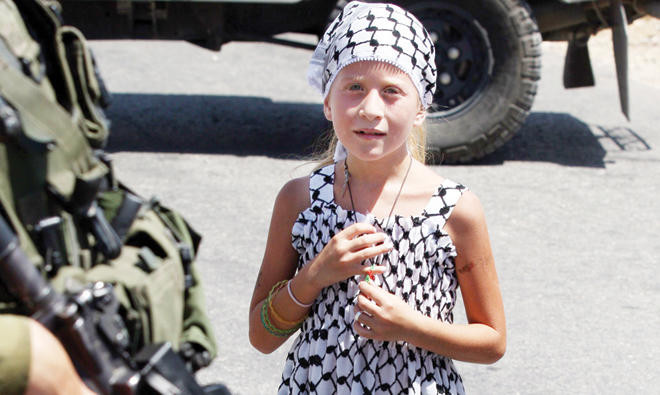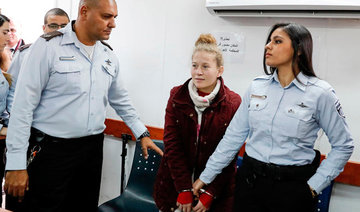JERUSALEM: Ahed Tamimi is only a teenager, but has repeatedly been at the center of the seemingly endless propaganda war between Israelis and Palestinians, with a video of her slapping soldiers the latest example.
Tamimi, 16 and recognizable by her shock of blonde hair, has been held up by Palestinians and other supporters as a brave opponent of Israel’s occupation of the West Bank.
A years-old photograph of her raising her fist at a soldier was widely published and led to her being received by then Turkish Prime Minister Recep Tayyip Erdogan in 2012.
She was also photographed while wearing a Tweety Bird shirt and biting the hand of an Israeli soldier in 2015 to try to stop the arrest of a brother.
But for Israeli officials, she is being made to star in staged provocations by her family, prominent activists who have been at the forefront of protests in their village of Nabi Saleh near Ramallah.
The latest incident led to her arrest on Dec. 19 along with that of her mother and cousin. She has been detained since and is due to appear in military court again later Thursday.
The three appeared in a video that went viral after it was recorded on Dec. 15 in Nabi Saleh.
It showed Tamimi and her cousin approaching two Israeli soldiers before shoving, kicking and slapping them.
The heavily armed soldiers do not respond in the face of what appears to be an attempt to provoke rather than seriously harm them.
They then move backward after Tamimi’s mother Nariman becomes involved.
Tamimi’s father argues that her blonde hair and Western dress have contributed to the attention she has received.
“If she was veiled and dark-skinned, would she have got the same attention?” Bassem Tamimi told AFP.
“The Zionist propaganda machine always depicts the Palestinian as dark-skinned and ugly, attacking the blonde victim, but now she is blonde.”
Michael Oren, a former Israeli ambassador to the US and currently a deputy minister for diplomacy, accused the Tamimis of using children as pawns, however.
“The Tamimi family — which may not be a real family — dresses up kids in American clothes and pays them to provoke (Israeli) troops on camera,” he wrote on Twitter.
“This cynical and cruel use of children constitutes abuse. Human rights organizations must investigate!”
Since her arrest early on Dec. 19, responses from either side could not be further apart.
Palestinian President Mahmoud Abbas has called her father and commended the family’s resistance against Israel’s occupation, official news agency WAFA reported.
Supporters have accused Israeli authorities of arresting a teenager who was only standing up for the rights of her fellow Palestinians.
The incident occurred during a day of clashes across the West Bank against US President Donald Trump’s controversial recognition of Jerusalem as Israel’s capital.
Violence since Trump’s decision has left 12 Palestinians dead, with most killed in clashes with Israeli forces.
The Tamimi family says a relative was shot in the head with a rubber bullet during protests on Dec. 15.
Israelis were divided over the viral video, with some praising the soldiers’ restraint and others saying it showed weakness and merited a tougher response.
Bassem Tamimi describes his daughter as “shy,” but “someone who is mature enough to reject the occupation responsibly.”
She had in the past wanted to become a professional football player, but has since decided to study law to defend her family and village against an Israeli occupation that has lasted more than 50 years, he said.
Regarding criticism of his family, Bassem Tamimi said “we don’t have to respond or defend ourselves,” calling it an attempt to distract from their cause.
But he said he fears his daughter will be imprisoned over the latest incident, particularly because it has become “a case of public opinion” in Israel.
Palestinian teen in ‘slap video’ back at center of propaganda war
Palestinian teen in ‘slap video’ back at center of propaganda war

Iran FM criticizes Israel for ‘doctrine of domination’

- Doctrine allows Israel to expand its military arsenal while pressuring other countries in the region to disarm
- His remarks came a day after renewed nuclear talks with Washington in Oman
DOHA: Iran’s Foreign Minister Abbas Araghchi on Saturday criticized what he said was a “doctrine of domination” that allows Israel to expand its military arsenal while pressuring other countries in the region to disarm.
His remarks came a day after renewed nuclear talks with Washington, with previous talks collapsing when Israel launched an unprecedented bombing campaign against Iran last June that triggered a 12-day war.
Araghchi was speaking at the Al Jazeera Forum conference in Qatar but made no reference to Friday’s talks with the United States.
“Israel’s expansionist project requires that neighboring countries be weakened: militarily, technologically, economically and socially,” Araghchi said.
“Under this project Israel is free to expand its military arsenal without limits ... Yet other countries are demanded to disarm. Others are pressured to reduce defensive capacity. Others are punished for scientific progress,” he added.
“This is a doctrine of domination.”
During the 12-day war Israel targeted senior Iranian military officials, nuclear scientists and sites as well as residential areas, with the US later launching its own attacks on key nuclear facilities.
Iran responded at the time with drone and missile attacks on Israel, as well as by targeting the largest US military base in the Middle East, located in Qatar.
On Friday, Araghchi led the Iranian delegation in indirect nuclear talks with US Middle East envoy Steve Witkoff in Muscat.
The top Iranian diplomat later described the atmosphere as having been “very positive,” while US President Donald Trump said the talks were “very good,” with both sides agreeing to proceed with further negotiations.
The talks followed threats from Washington and its recent deployment of an aircraft carrier group to the region following Iran’s deadly crackdown on anti-government protests last month.
The United States has sought to address Iran’s ballistic missile program and its support for militant groups in the region — issues which Israel has pushed to include in the talks, according to media reports.
Tehran has repeatedly rejected expanding the scope of negotiations beyond the nuclear issue.














